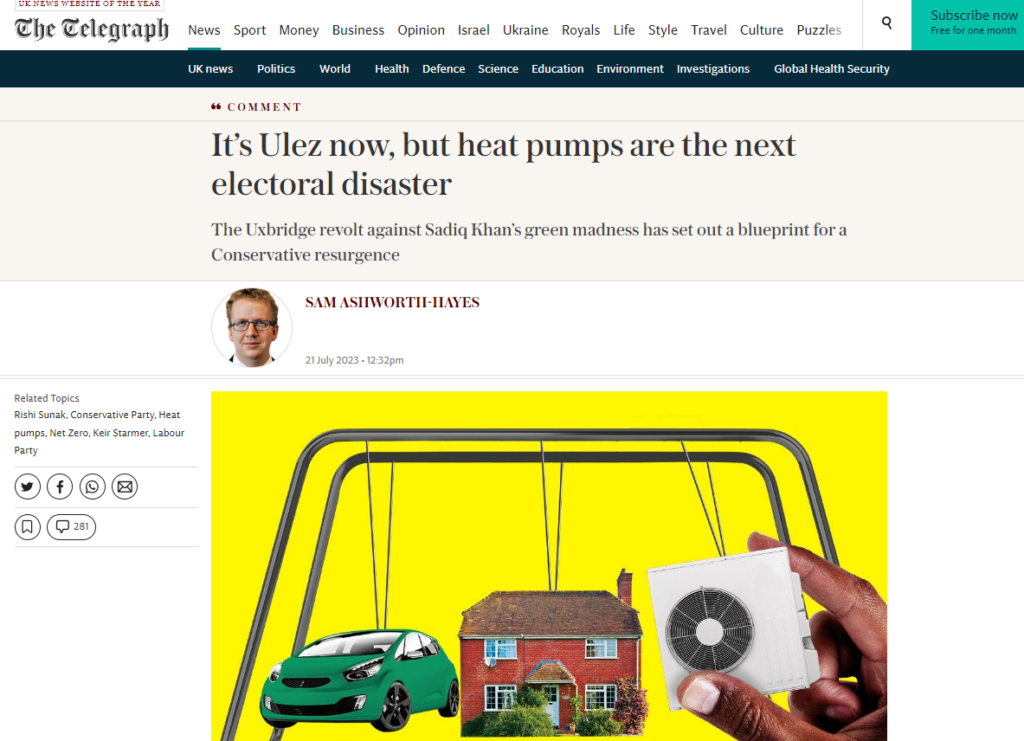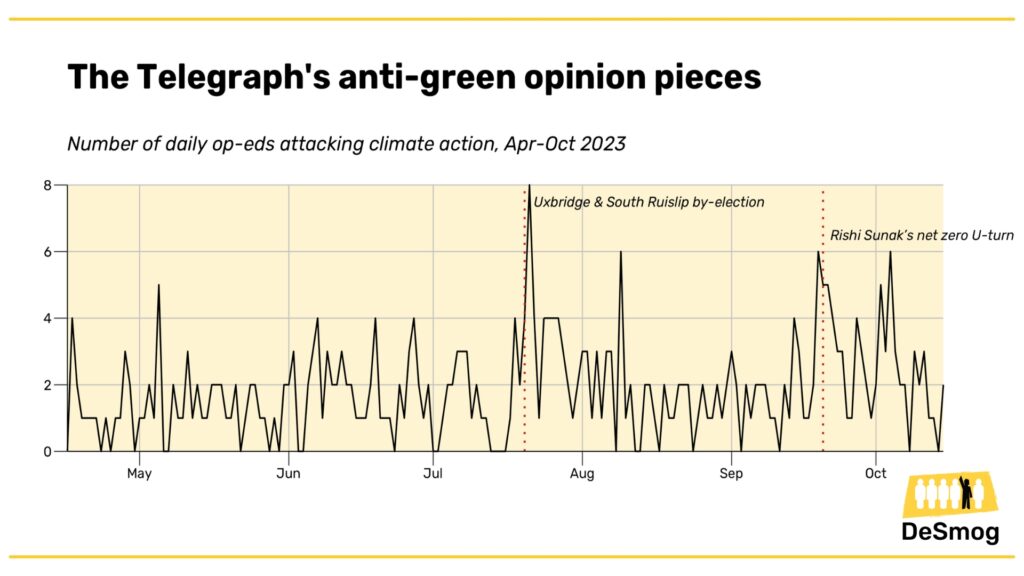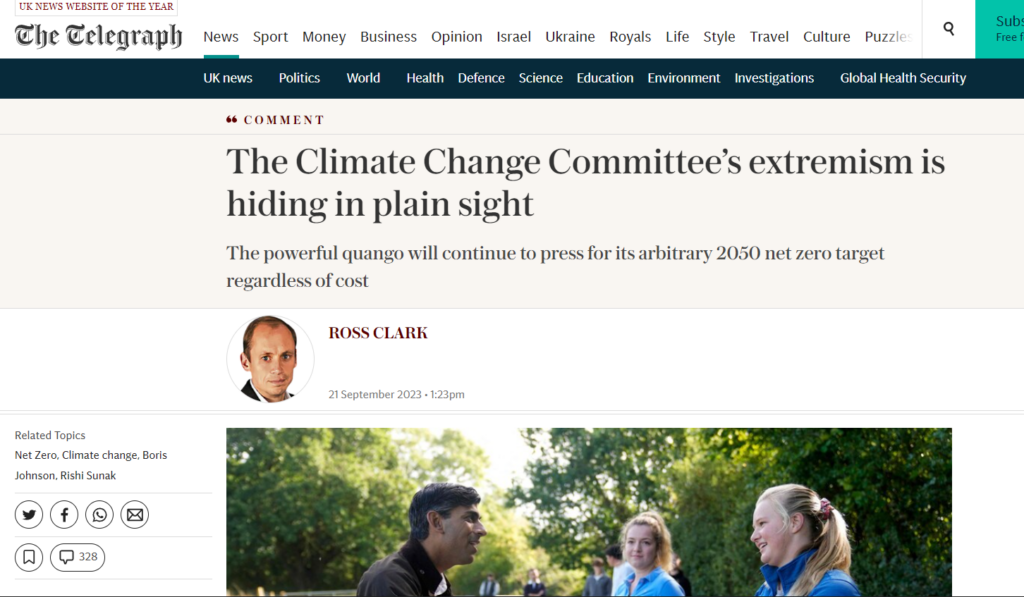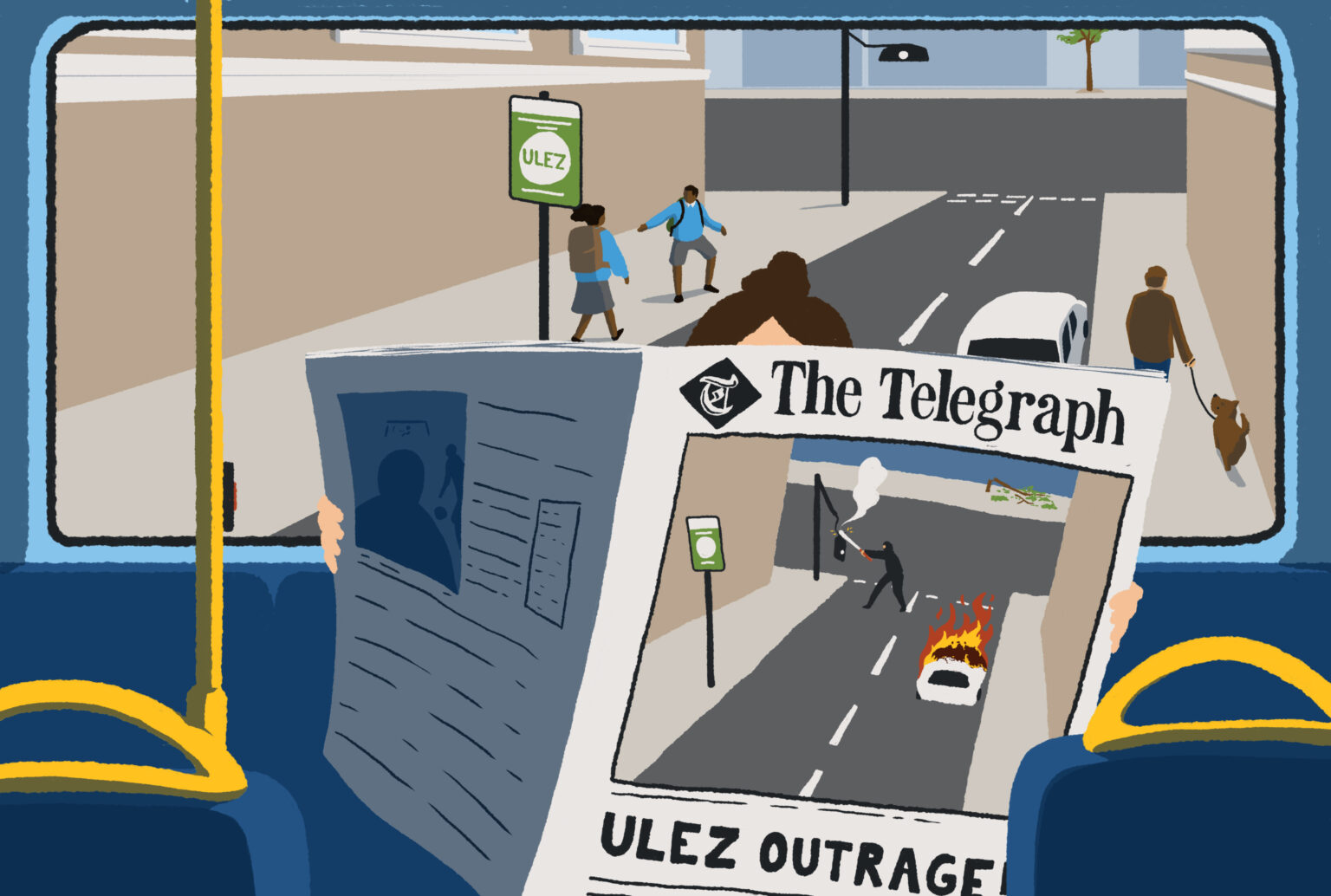Telegraph columnists routinely questioned climate science and criticised green reforms as a major backlash against net zero policies raged in the UK, DeSmog can reveal.
A new analysis by this website reviewed over 2,000 Telegraph opinion pieces and editorials published online over a six month period, ending in 16 October. Of the 171 opinion pieces that dealt with environmental issues, 85 percent were identified as “anti-green” : attacking climate policy, questioning climate science and ridiculing environmental groups.
It comes as an Abu Dhabi-backed investment fund RedBird IMI this week claimed it would be taking control of The Telegraph and Spectator, after months of speculation over the position of its previous owners, the Barclay family.
The Telegraph’s print circulation at the end of 2019, when it last released the data, was over 300,000. It had an online audience of 13.5 million in September this year.
This spate of anti-green stories from The Telegraph appeared in what is set to be the hottest year since records began in the late 1880s. A new Lancet report, published last week, found that heat-related deaths are on track to rise 370 percent by mid-century.
Throughout the six months, opinion writers attacked environmental activists, criticising their actions as a “narrow-minded crusade”. Vegan diets were characterised as “eco-extremism”, while U.S. President Joe Biden’s fear of climate-induced temperature rise was cast as “apocalyptic green fantasies”.
Heat pumps were regularly criticised, dubbed “China’s secret weapon in its drive to subvert the West” and “impractical and ineffective”. Research shows the clean heating devices are essential to decarbonising the UK’s gas-reliant homes and are more than twice as efficient as oil and gas boilers in cold temperatures.
Other writers regularly undermined the effectiveness of renewable energy. “Wind power is not cheap or secure. Nor is it clean”, Conservative peer Matt Ridley wrote in one column, despite evidence that renewable energy in the UK is significantly cheaper than gas. Ridley wrote last year that global heating was “mostly beneficial”.
Ridley is an advisor to the Global Warming Policy Foundation (GWPF), the UK’s main climate denial group, which is based on Westminster’s Tufton Street. Ridley was one of 10 Telegraph opinion writers found by the analysis to have links to the GWPF or its campaign arm, Net Zero Watch.
Overall, nearly one in five (18 percent) of the 1,930 opinion pieces reviewed by DeSmog featured an attack on climate science, policy or environmental groups. Nearly one in 10 of The Telegraph’s ‘View’ pieces – editorials expressing the views of the newspaper – addressed the environment in some way. All of these were anti-green.
The Telegraph Media Group did not respond to DeSmog’s request for comment.
Bob Ward, policy and communications director at the Grantham Research Institute on Climate Change and the Environment, said the editors of The Telegraph had “lost their minds when it comes to climate change”.
“Both newspapers [The Telegraph and Sunday Telegraph] are campaigning against climate policies,” Ward told DeSmog. “They are bombarding their poor readers with laughable propaganda, particularly in their comment columns.”

Policy Pile-on
Conservative MPs consider The Telegraph their second most trusted newspaper, according to a Press Gazette poll conducted in August.
But the views expressed by Telegraph columnists appear at odds with those of the majority of Conservative voters. A 2022 poll conducted by the Onward think tank for ConservativeHome found that Tory voters strongly support net zero, and that “rowing back on environmental commitments risks alienating voters in key marginal seats that will be targets for other parties”.
Despite the overall support for net zero among the Conservatives, a by-election in Boris Johnson’s former seat of Uxbridge and South Ruislip on 20 July was widely framed as a quasi-referendum for an expanded ultra-low emission zone (ULEZ) in Greater London.
Conservative candidate Steve Tuckwell won on a single-issue campaign opposing the clean air zone, beating his Labour rival by 495 votes. The campaign resulted in a flurry of negative Telegraph opinion pieces on the subject – many falsely conflating the result with a condemnation of the UK’s net zero targets.
The Telegraph published 30 opinion pieces about ULEZ, 26 of which criticised the scheme – naming it a “scam”, “disastrous”, “pointless eco-posturing”, “a dagger in the heart of London’s economy”. One claimed that London Mayor Sadiq Khan was “destroying London”.
On 22 July, Conservative London mayoral candidate Susan Hall penned an opinion in which she pledged to scrap ULEZ “on day one” if elected. Days later, The Telegraph published an editorial ‘View’, calling on ministers to “put ULEZ into reverse”.
Only four opinion pieces published by The Telegraph over this time expressed any positive sentiment about the clean air scheme, including one written by Khan. A report by Greater London Authority, produced a month after the scheme was officially introduced, showed the expansion was working, with 95 percent of vehicles across inner and outer London now compliant with clean air standards.
Debates around ULEZ and net zero raged throughout the summer.
In August, Prime Minister Rishi Sunak ruled out a net zero referendum, and committed to keeping the UK’s legally binding 2050 net zero targets. On 20 September, however, he alarmed civil servants, experts and green groups by announcing a dramatic rollback of net zero policies.
These included delaying the ban on sales of new petrol and diesel vehicles and gas boilers from 2030 to 2035, and dropping proposed household energy efficiency standards. At the time, Greenpeace chief scientist Doug Parr described the rollback as a “monumental failure of international leadership, vision, economic forethought”.
In the aftermath, Telegraph opinion writers produced 19 net zero-critical opinion pieces. Headlines included: “Britain has finally joined the net sensibles”, “Theresa May’s legacy [of net zero] is driving Britain into the ground”, and “On net zero, Britain can’t afford to be the moral model to the world”.
A poll conducted in September, shortly after the announcement, found that over half of those who voted for the Conservative Party in 2019 still backed net zero targets.
Dr James Painter, Research Associate at the Reuters Institute at the University of Oxford, said The Telegraph was “trying to influence the net zero policy agenda” through its opinion pieces.
“Research shows that The Telegraph, historically, has been probably the right-wing broadsheet that has given voice, particularly in its opinion, editorials, to different forms of climate scepticism,” he told DeSmog.
“The publication has a very significant influence over the Conservative Party: MPs, Conservative Party activists and probably Tory voters as well.”
Research published by Painter in 2015 showed that The Telegraph has been among the UK newspapers that are most likely to platform uncontested climate-sceptical voices, typically written by in-house columnists.

Prolific
Spectator journalist Ross Clark produced the highest number of anti-green columns for The Telegraph. He wrote 27 pieces attacking climate legislation or science over the six months, calling ULEZ a “war on motorists”, the net zero target “arbitrary”, and heat pumps “a plague on all our houses”.
Clark is a long-term critic of net zero policies, and earlier this year published a book on the subject: ‘Not Zero: How an Irrational Target Will Impoverish You, Help China (and Won’t Even Save the Planet)’.
A number of the most prolific Telegraph columnists also held direct links to climate denial groups, the research found.
Ten opinion writers were board members or academic advisors at the Global Warming Policy Foundation (GWPF). They wrote a total of 144 opinion pieces for The Telegraph during the period examined — averaging over 2.5 per week.
GWPF and its campaign arm Net Zero Watch are based in Westminster’s Tufton Street, home to a small but influential network of libertarian, pro-Brexit think tanks and lobby groups with links to climate science denial.
Last year, a GWPF report described 2022 — the hottest year on record in the UK — as “warm, but unalarming”. Its author said that the UK climate “remains absolutely benign”. The GWPF has also expressed the view that carbon dioxide has been mis-characterised as pollution, when in fact it is a “benefit to the planet”.
Allison Pearson, a columnist at The Telegraph and a board member of GWPF, penned 57 articles for the publication over the six months.
All 10 of her columns written on environmental topics expressed anti-green views – including one that said “net zero zealotry” would inflict “freezing dark and cold” upon British people. Pearson also called for the 2008 Climate Change Act — which enshrined climate targets in UK law for the first time — to be repealed, and for Brits to be “freed from its crazy, punitive legal targets”.
Charles Moore, the former editor of The Daily Telegraph, The Sunday Telegraph and The Spectator, wrote 41 articles over the six month time period, including 14 which exhibited anti-green views, and none that could be considered pro-green.
On 25 July, Moore argued that climate change reporting amounted to “panic stories” which are “harder to put out than the real fires themselves”, despite the continued overwhelming consensus on the threats posed by climate change and the urgent need to decarbonise.
Current and former GWPF members published by The Telegraph included Conservative peers David Frost, Matt Ridley and Peter Lilley, Allison Pearson, Charles Moore, and former Australian Prime Minister Tony Abbott.
The Telegraph also published three opinion pieces by Neil Record, the chair of the GWPF’s campaigning arm, Net Zero Watch, although the pieces did not mention environmental issues. Net Zero Watch produces regular reports contradicting the scientific consensus on climate change.
Nowhere in the articles or the columnists’ profiles are their affiliation to the climate denial group mentioned.
The Telegraph has “a long tradition of giving a voice to non-experts”, James Painter, of the Reuters Institute, said.
“But they should be transparent,” he added, “because the reader needs to make a judgement as to where these concerns are coming from, and whether there’s any invested interests.”
In 2021, the paper ran a front-page spread showing a poll of public support for a referendum on the UK’s net zero goal. DeSmog revealed it was paid for by a climate denial group, CAR26, which is fronted by a leading member of Laurence Fox’s Reclaim Party.
Bob Ward, of the Grantham Research Institute, said the Telegraph titles had become “parodies of their former selves”.
“Some of the opinion articles these newspapers have published are, frankly, ridiculously inaccurate and misleading, and usually written by cranks from the Global Warming Policy Foundation who have no expertise on climate change or climate policy,” he said.
“These articles are undermining democracy by conning their readers about the science, economics and politics of climate change.”

Telegraph Stance
Senior editorial staff at The Telegraph regularly penned anti-climate opinion pieces, DeSmog’s research showed.
Allister Heath, The Sunday Telegraph editor, wrote 23 articles overall during the timeframe, while almost 70 percent of these pieces were anti-climate. They featured the claims that “Blair and Brown still rule Britain” because of the Conservatives’ net zero stance, and that “the lunacy of climate change fanatics is driving humanity to extinction”.
Camilla Tominey, The Telegraph’s associate editor, penned 41 columns during that time – including 11 attacking climate issues.
Tominey holds shares in GB News — a right-wing broadcaster with a record of downplaying climate change — according to a Financial Times investigation. Previous DeSmog analysis found that one in three GB News presenters had cast doubt over climate science or policy live on air in 2022.
Every one of the 31 ‘Telegraph View’ pieces published on environmental issues attacked climate policies or climate science, for example urging Prime Minister Rishi Sunak to reconsider “the ruinous approach to net zero”.
This editorial stance is reflected in other areas of The Telegraph’s coverage, despite its stated commitment to “advancing sustainable initiatives across the business and in its editorial coverage”. Its new electric vehicle (EV) channel, launched this year, houses a mix of features, reviews and opinion articles.
Despite its ambitions to promote EVs, The Telegraph ran a number of anti-EV opinion pieces this year, among them: “Nobody wants an electric car” and “You’d have to pay me to buy an electric car”.
In another piece, titled “The great electric car experiment has taken a dangerous turn”, the author claims that electric cars are liable to combust or malfunction, casting doubt over their feasibility and safety, despite evidence that cars with internal combustion engines are five to six times more likely to combust.
In August, the publication introduced a ‘Net Zero’ section under its ‘money’ page. Multiple opinion pieces explicitly attacked efforts to reach net zero, including “Why heat pumps will never work in Britain” and “Four reasons why solar panels won’t work on your home”.
Jennie King, Head of Climate Research and Policy at the Institute for Strategic Dialogue think tank, said influential publications have a responsibility to provide accurate information on climate change.
“Newspapers and other ‘legacy media’ have a unique place in public discourse,” King told DeSmog.
“Outlets like The Telegraph boast a historic brand and an important audience that cross many segments of British society, who may view them as singular sources of information and analysis on key issues.”
All of the individuals referenced in this article were contacted for comment.
Note on methodology
DeSmog reviewed every Telegraph opinion piece published online between 16 April and 15 October 2023 – 1,930 in total. Articles were then searched for the presence of the following keywords: “oil,” “gas,” “environment,” “green,” “net zero,” “climate,” “carbon,” and “ULEZ”. Those which do not match any of the keywords were excluded from the sample, leaving a total of 770 articles for review.
The context in which the keywords were used was then checked to determine if the articles referenced environmental issues and in which ways. Articles were categorised in the following ways: is the article about a green topic; is there a large mention of green issues in the articles; is there a passing mention of green issues; does the article attack climate science, climate action, green actors or green policies; does the article endorse climate science, climate action, green actors or green policies.
The same methodology was also applied to articles from The ‘Telegraph View’ section of the website – the initial sample gathered consisted of 333 articles, which was narrowed down to 63 after conducting a keyword search.
Subscribe to our newsletter
Stay up to date with DeSmog news and alerts







